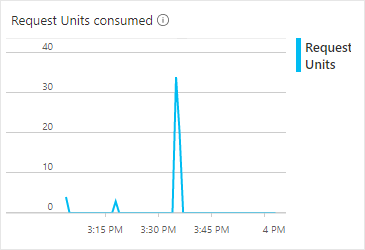Events
Jan 14, 8 PM - Feb 25, 7 PM
Azure Cosmos DB Conf 2025 Call for Proposals
Submit your session proposal by Feb. 25th and be part of Azure Cosmos DB Conf 2025.This browser is no longer supported.
Upgrade to Microsoft Edge to take advantage of the latest features, security updates, and technical support.
APPLIES TO:
NoSQL
MongoDB
Cassandra
Gremlin
Table
For an Azure Cosmos DB pricing option that's based on only the resources that you use, choose the Azure Cosmos DB serverless account type. With the serverless option, you're charged only for the request units (RUs) that your database operations consume and for the storage that your data consumes. Serverless containers can serve thousands of requests per second with no minimum charge and no capacity planning required.
Important
Do you have any feedback about serverless? We want to hear it! Feel free to drop a message to the Azure Cosmos DB serverless team: azurecosmosdbserverless@service.microsoft.com.
Every database operation in Azure Cosmos DB has a cost that's expressed in RUs. How you're charged for this cost depends on the type of Azure Cosmos DB account you choose:
The Azure Cosmos DB serverless option best fits scenarios in which you expect intermittent and unpredictable traffic and long idle times. Because provisioning capacity in these types of scenarios isn't required and might be cost-prohibitive, Azure Cosmos DB serverless should be considered in the following use cases:
For more information, see Choose between provisioned throughput and serverless.
Azure Cosmos DB serverless is a new account type in Azure Cosmos DB. When you create an Azure Cosmos DB account, you choose between provisioned throughput and serverless options.
To get started with using the serverless model, you must create a new serverless account. Migrating an existing account to or from the serverless model currently isn't supported.
Any container that's created in a serverless account is a serverless container. Serverless containers have the same capabilities as containers that are created in a provisioned throughput account type. You read, write, and query your data exactly the same way. But a serverless account and a serverless container also have other specific characteristics:
If you've used the Azure Cosmos DB provisioned throughput model before, you might find that the serverless model is more cost-effective when your traffic doesn't justify provisioned capacity. The tradeoff is that your costs become less predictable because you're billed based on the number of requests that your database processes. Because of the lack of predictability when you use the serverless option, it's important to monitor your current consumption.
You can monitor consumption by viewing a chart in your Azure Cosmos DB account in the Azure portal. For your Azure Cosmos DB account, go to the Metrics pane. On the Overview tab, view the chart that's named Request Units consumed. The chart shows how many RUs your account has consumed for different periods of time.

You can use the same chart in Azure Monitor. When you use Azure Monitor, you can set up alerts so that you're notified when your RU consumption passes a threshold that you set.
Azure Cosmos DB serverless extends high availability support with availability zones in designated regions. The associated Service Level Agreements (SLAs) are aligned with the Single-region writes with availability zone configuration, ensuring reliability for your deployments.
To get started with using the serverless pricing option in Azure Cosmos DB, review the following articles:
Events
Jan 14, 8 PM - Feb 25, 7 PM
Azure Cosmos DB Conf 2025 Call for Proposals
Submit your session proposal by Feb. 25th and be part of Azure Cosmos DB Conf 2025.Training
Module
Configure Azure Cosmos DB for NoSQL - Training
Select between the various throughput offerings in Azure Cosmos DB for NoSQL.
Certification
Microsoft Certified: Azure Cosmos DB Developer Specialty - Certifications
Write efficient queries, create indexing policies, manage, and provision resources in the SQL API and SDK with Microsoft Azure Cosmos DB.